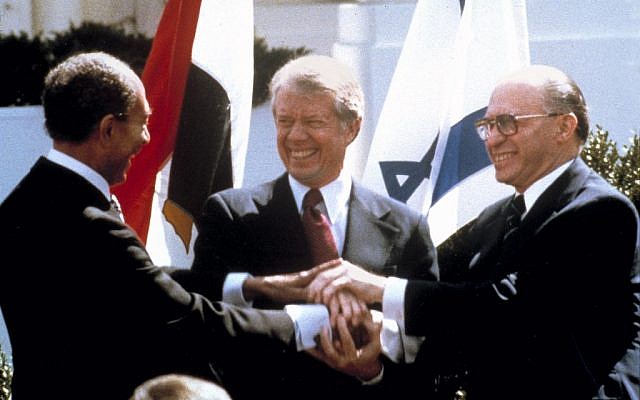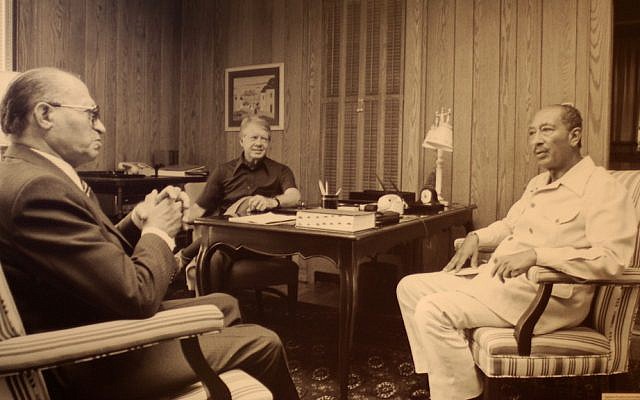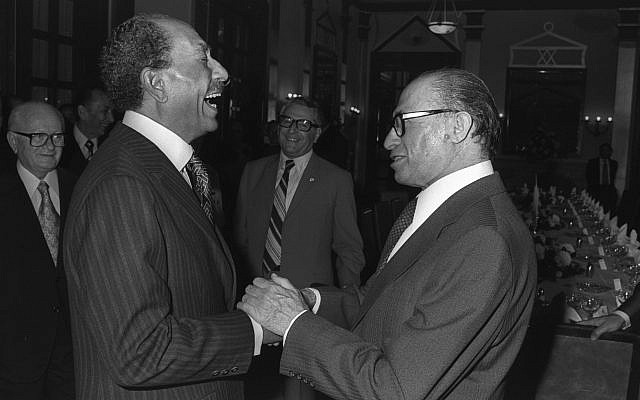Marking 40 years to Camp David accords, the Center for Israel Education is rolling out memos detailing negotiations that led to Israel-Egypt peace treaty

WASHINGTON, DC — It has been almost 40 years since former president Jimmy Carter initiated the negotiations that led to Israel’s peace treaty with Egypt. To commemorate that historic accomplishment, the Center for Israel Education is incrementally releasing sensitive memoranda from the Carter administration archives detailing those negotiations.
Most recently, the educational non-profit unveiled a March 1978 meeting in Washington, DC, between the Carter and prime minister Menachem Begin’s delegations, at a time when the US warned there was a risk of losing the momentum gained after Egyptian leader Anwar Sadat unexpectedly visited Jerusalem to address the Knesset.
The conversation showed an American president intent on securing a broader peace agreement between Israel and the Arab world, one that would see Israel relinquish not just the Sinai, but most of the West Bank, Gaza and Golan Heights, as well.
The foreign minister at the time, Moshe Dayan, strenuously objected to that plan. He argued that the West Bank falling under Arab control would endanger Israel — he instead proposed that Israel not impose sovereignty over the territory, but not extract its military from there either.

“Israeli forces will stay there to defend Israel, but not to rule the Palestinians,” he said. “This is equivalent to withdrawal, not in a territorial sense, but in substance.”
The memo showed how the Carter administration wanted that withdrawal to establish a Palestinian state, and yet how its diplomats also insisted that a complete and total pullout to all pre-1967 borders was not a requisite for a peace agreement.
The Israelis asserted that leaving the West Bank was not necessary to fulfill United Nations resolution 242, which was passed following the 1967 Six Day War with Israel’s support. The text called on Arab states to accept Israel’s right to “live in peace within secure and recognized boundaries free from threats or acts of force” and for all sides to seek a lasting peace.
The Palestinians objected to the resolution because it made no explicit reference to them, a point Begin’s delegation emphasized in its meeting with Carter when it disapproved of their proposal.
Begin said Sadat had given up his early insistence that Israel relinquish Palestinian territories for a peace accord with his country.
“The Egyptians initially gave us a proposal calling for withdrawal from Sinai, the West Bank, Gaza and Golan. We said this was impossible,” the former Israeli premier stated. “We said that 242 does not call for total withdrawal. Sadat agreed to drop this demand.”
(Later in the memo, Begin also says that Sadat was demanding complete Israeli removal from all areas captured in the war — and the emergence of a Palestinian state.)
Yet it was Zbigniew Brzezinski, Carter’s national security adviser, who issued the most dire warning regarding Israel maintaining its presence in the West Bank, characterizing it as possibly an attempt for Israel to “perpetuate [its] control of the area,” rather than to merely protect its people.
“If Israel were to speak of its forces being withdrawn from control of the West Bank and Gaza to agreed emplacements, and if authority were to devolve from Israel and Jordan, then your own plan could be the basis for a solution and could open the way to peace,” Brzezinski told the Israelis.

“Alternatively, there could be strong suspicions that you intend to perpetuate your control, and that you intend to deal very differently with the Sinai and with the West Bank. We need a solution to make clear that your plan can be the basis for peace. Then Egypt, Jordan, and moderate Palestinians who want to coexist with Israel can move forward.”
The meeting ended with Carter asking Begin to be “flexible” about potential paths forward in negotiations, saying “we have reached the point of possible success. But we are on the verge of seeing that lost.”
Carter insisted that Egypt and Jordan were not demanding Israel totally cede the captured territories. He also said that Saudi Arabia would accept a proposal that did not include the establishment of a Palestinian state. The biggest “question mark,” Carter said, was how Syria would respond.
Begin closed by telling Carter he would think more about his suggestions — and that he would speak with him again later that evening.
The Center for Israel Education said the memo of that discussion was the fourth in a 10-part series that will highlight the Carter administration’s attempts to resolve the Arab-Israeli conflict.

The Carter-brokered negotiations between Israel and Egypt resulted in the signing of the Camp David Accords in September 1978, after 12 days of secret negotiations at Camp David, the presidential retreat in the Catoctin Mountain region of Thurmont, Maryland.
The Israeli-Egypt peace treaty was later signed in March 1979. Begin and Sadat were ultimately awarded a Nobel Peace Prize for clinching the peace deal.
As reported by The Times of Israel
